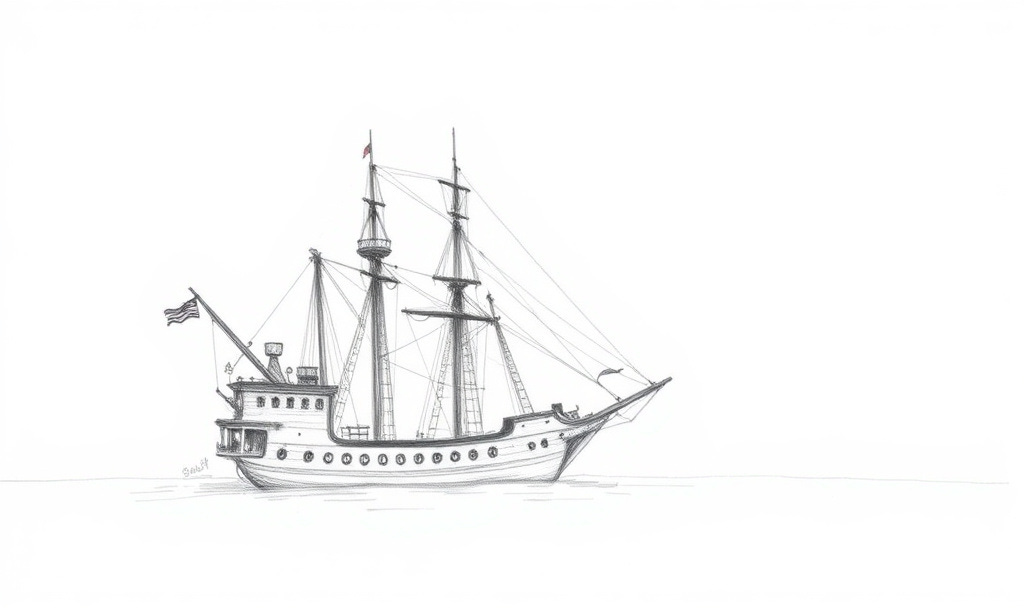Mooncake, Ian Urbina | Somalia
Russian post-rock pioneers transformed investigative journalism about Somali piracy into atmospheric instrumental music for The Outlaw Ocean Music Project in 2020.
Story Behind “Somalia”
When Journalism Becomes Music
“Somalia” emerged from an unprecedented collaboration between art and journalism. In 2020, Russian post-rock band Mooncake joined The Outlaw Ocean Music Project, a first-of-its-kind initiative where musicians create music inspired by investigative journalist Ian Urbina’s reporting on lawlessness at sea.[1] When Urbina approached Mooncake about the project, the Moscow-based band realized how little they actually knew about oceanic problems. “Probably like most people, we had heard of Somali pirates, poaching, illegal whaling and, of course, pollution in our waters,” they explained.[2]
Urbina had spent five years reporting from the high seas for his New York Times bestselling book The Outlaw Ocean, documenting everything from trafficking and slavery to environmental crimes. During his reporting, he built an audio library of field recordings—machine-gun fire off the coast of Somalia, chanting captive deckhands, the sounds of a lawless realm few realized existed.[1] These recordings became raw material for hundreds of artists across 40 countries to transform journalism into music.[3]
The Baltic Sea Meeting Russian Post-Rock
For Mooncake, the project connected deeply with their musical philosophy. “The theme of the seas and oceans, or big water, is very close to us and forms the basis for many of our songs,” the band stated.[2] Their previous album had been recorded near the Baltic Sea, drawing inspiration from what they described as its “endless and inexhaustible energy.”[2] The opportunity to contribute to Urbina’s stories about ocean-related human rights and environmental abuses felt like a natural extension of their atmospheric, space-focused sound.
Founded in Moscow in 2006, Mooncake had established themselves as one of Russia’s leading instrumental post-rock bands, compared to Pink Floyd and Mogwai but maintaining their own distinctive style.[4] By 2020, they had released multiple albums, toured extensively across Russia, the Baltics, and China, and shared stages with God Is An Astronaut, Explosions in the Sky, and Russian Circles.[5] “Somalia” represented their first venture into music that directly interacted with journalism.
“Somalia” Recording and Production Details
Instrumental Post-Rock Meets Field Recordings
Mooncake composed and produced “Somalia” as part of their two-track contribution to The Outlaw Ocean Music Project, released alongside “Ocean” on June 5, 2020.[6] The band’s core members—Pavel Smirnov on guitars, Anton Marchenko on bass, Nikolay Bulanov on cello and keys, and their drummer—crafted the track using their signature approach of blending organic acoustic instruments with electronic textures.[4]
The production philosophy aligned with The Outlaw Ocean Music Project’s goal of using sound to convey emotions that words alone cannot capture. As Mooncake explained, “Music is one of the most crucial drivers in the world and important for evoking emotions and feelings in people...if a well-written literary text can reach people’s minds, then music penetrates the soul and gives the work a strong emotional color.”[2]
Synesthesia Media and the Collaborative Model
The release came through Synesthesia Media, the label Urbina founded to manage The Outlaw Ocean Music Project.[1] Artists participating in the project split streaming revenue 50/50 with the label, with Urbina listed as co-artist on tracks due to his field recordings and reporting forming the inspirational foundation.[7] The business model aimed to use streaming revenue to fund additional journalism projects focused on human rights, labor, and environmental abuses at sea.[8]
Mooncake’s contribution was mastered and released in high-quality formats, maintaining the band’s commitment to production excellence that had earned them praise from mastering engineers like John Davis of Metropolis Mastering in London.[4]
Notes About “Somalia” by Mooncake, Ian Urbina
Release Date: June 5, 2020
Duration: Approximately 5:00
Genre: Post-Rock / Instrumental / Ambient / Space Rock
EP: Offshore Frontier (Inspired by ‘The Outlaw Ocean’ a book by Ian Urbina)
Composers/Performers: Mooncake (Pavel Smirnov, Anton Marchenko, Nikolay Bulanov, Anton Strotz)
Project Creator: Ian Urbina
Label: Synesthesia Media
Format: Digital release via streaming platforms and Bandcamp
Mooncake “Somalia” Era Band Details
EP Details
EP: Offshore Frontier (Inspired by ‘The Outlaw Ocean’ a book by Ian Urbina)
Release Date: June 5, 2020
Label: Synesthesia Media
Track Listing: 1. Ocean, 2. Somalia
Project: The Outlaw Ocean Music Project
Source Material: Inspired by Ian Urbina’s investigative journalism and field recordings
Format: Available in MP3, FLAC, and high-quality digital formats
Band Members
Pavel Smirnov - Guitars
Anton Marchenko - Bass
Nikolay Bulanov - Cello, Keys
Anton Strotz - Drums (era-specific)
Ian Urbina - Field Recordings, Project Creator (credited as co-artist)
Production Notes
Part of global collaboration featuring 400+ artists from 60+ countries[3]
Inspired by The Outlaw Ocean book chronicling lawlessness on high seas
Band’s approach combines instrumental post-rock with space rock atmospherics
Mooncake founded in Moscow, 2006, established as leading Russian post-rock act[4]
Previous albums include Lagrange Points (2008) and Zaris (2013)
Band toured extensively throughout Russia, Baltic countries, and China[5]
Released through Fluttery Records partnership before Outlaw Ocean project
Interesting Facts About “Somalia”
The Controversial Music Project Model
The Outlaw Ocean Music Project, which birthed “Somalia,” became controversial in 2021 when musician Benn Jordan accused Urbina of exploiting artists.[7] Jordan claimed Urbina kept most revenue through Synesthesia Media while being listed as co-artist on 400+ songs he didn’t actually compose. Musicians reported feeling misled about the revenue structure and Urbina’s co-artist credits appearing on work they created independently.[7]
Urbina defended the model, stating streaming revenue would fund journalism projects after recouping startup costs.[8] He emphasized that artists were told not to expect significant streaming income and that the project’s value lay in raising awareness about ocean abuses.[8] The controversy highlighted tensions between artistic collaboration and commercial exploitation, with some musicians supporting the project’s mission while others felt deceived about its structure. Despite the controversy, the project continued, having generated millions of streams and introduced Urbina’s investigative reporting to audiences who might never read The New York Times.
Russia’s Post-Rock Export Meeting Global Journalism
“Somalia” represents a unique cultural exchange—Russian musicians interpreting American journalism about East African piracy through instrumental post-rock. Mooncake, sometimes called Russia’s answer to Mogwai, brought their distinctly European atmospheric sensibility to stories from the world’s most lawless waters.[4] The band’s description of their musical goal—”to open the door to infinite space and cosmos in any everyday thing”[4]—found perfect expression in translating Urbina’s maritime reporting into soundscapes.
The collaboration proved that music could serve as “cultural diplomats on behalf of journalism,”[8] reaching demographics like Urbina’s teenage son who consume news through alternative channels like music streaming rather than traditional outlets. For Mooncake, the project reinforced their belief that “since governments are not readily addressing many of the problems outlined in the book, it is pivotal that investigations and reporting on this extremely important subject continue.”[2] “Somalia” became more than a track—it became advocacy through atmosphere, activism through instrumental post-rock.
Common Questions
Q: What is “Somalia” by Mooncake about? A: “Somalia” is an instrumental post-rock composition inspired by investigative journalist Ian Urbina’s reporting on Somali piracy and lawlessness on the high seas from his book The Outlaw Ocean. The track translates journalism about maritime crime into atmospheric music as part of The Outlaw Ocean Music Project.
Q: Who is Mooncake? A: Mooncake is a Russian instrumental post-rock band founded in Moscow in 2006. The band features Pavel Smirnov on guitars, Anton Marchenko on bass, Nikolay Bulanov on cello and keys, and has become one of Russia’s leading post-rock acts, compared to Pink Floyd and Mogwai while maintaining their own space rock-influenced style.
Q: What is The Outlaw Ocean Music Project? A: The Outlaw Ocean Music Project is a collaboration between investigative journalist Ian Urbina and 400+ musicians from 60+ countries who create music inspired by Urbina’s reporting on lawlessness at sea. The project uses field recordings Urbina made during five years of maritime reporting and aims to raise awareness about human rights, labor, and environmental abuses in international waters.
Q: Why is Ian Urbina credited on “Somalia”? A: Ian Urbina is credited as co-artist on all Outlaw Ocean Music Project tracks because his investigative journalism, book, and field recordings serve as the inspirational foundation for the music. The credit structure became controversial, with some musicians claiming it reduced their royalty shares, though Urbina maintains the project funds additional journalism.
Q: Where can I listen to “Somalia” by Mooncake? A: “Somalia” is available on streaming platforms including Spotify, Apple Music, and Bandcamp as part of the EP Offshore Frontier (Inspired by ‘The Outlaw Ocean’ a book by Ian Urbina). The track is part of The Outlaw Ocean Music Project catalog released through Synesthesia Media.
References
The Outlaw Ocean Music Project - About The Project
The Outlaw Ocean Music Project - Mooncake Artist Page
Pulitzer Center - Behind the Story: The Outlaw Ocean Music Project
Fluttery Records - Mooncake Artist Profile
Last.fm - Mooncake Biography
Mooncake Bandcamp - Offshore Frontier EP
The FADER - Ian Urbina Issues Apology After Controversy
San Francisco Classical Voice - Art and Advocacy Combine in the Outlaw Ocean Music Project




